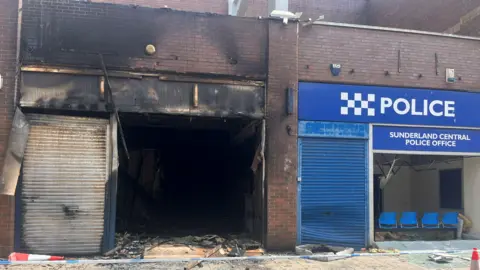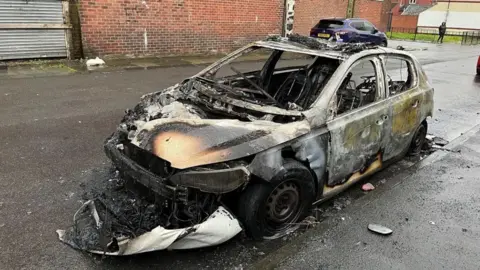Face recognition used to identify riot suspects
 PA
PAPolice used facial recognition technology to help identify suspects involved in the summer riots.
Northumbria Police said it had used the software to help it make several arrests in Sunderland linked to the city's disorder on 2 August.
Cleveland and Durham forces did not use the technology to identify suspected rioters, the BBC has confirmed.
Privacy campaign group Big Brother Watch said the technology was "dangerously unregulated" and its use by police was "concerning from a privacy perspective".
Northumbria Police said it had used the "latest" facial recognition software to review more than 10,000 hours of CCTV footage linked to the Sunderland riot.
Det Ch Insp Graeme Barr said: "These offenders may think that because they wore masks or concealed their faces that we can’t trace them, but they would be mistaken."

Durham Police said it did not have its own facial recognition technology but had access to the Home Office Police National Database.
It said it had not used the national database to identify suspected rioters because it only had to identify a "small amount" of suspects in its jurisdiction.
Cleveland Police has been approached for comment.
Big Brother Watch said it was important those who broke the law during the riots were brought to justice.
But it added there were "real questions" to be answered about the use of facial recognition technology.
"Regulation of these practices is badly needed in order to protect our right to privacy," a spokesperson said.
Northumbria Police said the violent disorder in Sunderland was "utterly shocking" and "completely unacceptable".
"We would hope the overwhelming majority of people would want and expect us to use every tactic at our disposal to help identify potential suspects," a spokesperson said.
The riots, which broke out in parts of England, followed the fatal stabbings of three girls in Southport, Merseyside, on 29 July, with unrest fuelled by misinformation on social media that the suspect was an illegal migrant.
Follow BBC North East on X, Facebook, Nextdoor and Instagram. Send your story ideas to [email protected].
